Reflective Report: Leadership, Communication, and Team Dynamics
VerifiedAdded on 2019/09/20
|9
|1902
|177
Report
AI Summary
This reflective report analyzes a student's experience in a team simulation project, focusing on leadership, communication, and negotiation skills. The report details the student's role as a key negotiator and the challenges faced due to a mismatch between personality profile and assigned role, including lack of effective communication and negotiation abilities. It discusses the importance of communication, delegation, and time management within team dynamics. The student reflects on personal experiences, highlighting setbacks due to ineffective communication and delegation, particularly in assigning tasks and managing schedules. The report also applies transformational leadership theory and self-efficacy to improve team performance. The conclusion summarizes the lessons learned from the project, emphasizing improvements in communication, leadership skills, and the importance of aligning individual strengths with assigned roles for future success. The student utilized relevant research to support their reflection.

Reflective Work 1
Reflective Writing
Name
Submitted to
Date
Reflective Writing
Name
Submitted to
Date
Paraphrase This Document
Need a fresh take? Get an instant paraphrase of this document with our AI Paraphraser

Reflective Work 2
Table of Contents
Introduction......................................................................................................................................4
Reflective Report.............................................................................................................................4
Conclusion.......................................................................................................................................7
Table of Contents
Introduction......................................................................................................................................4
Reflective Report.............................................................................................................................4
Conclusion.......................................................................................................................................7

Reflective Work 3
⊘ This is a preview!⊘
Do you want full access?
Subscribe today to unlock all pages.

Trusted by 1+ million students worldwide
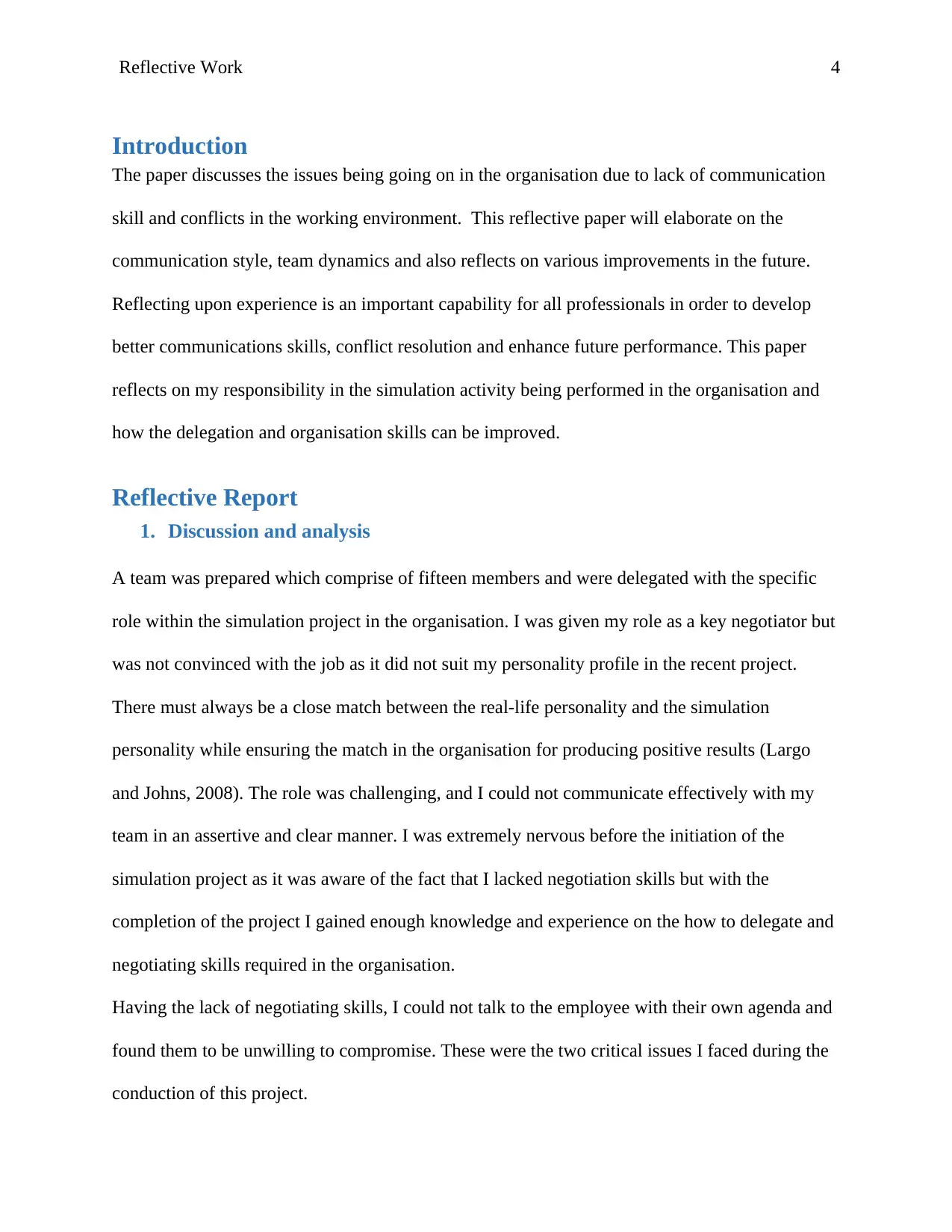
Reflective Work 4
Introduction
The paper discusses the issues being going on in the organisation due to lack of communication
skill and conflicts in the working environment. This reflective paper will elaborate on the
communication style, team dynamics and also reflects on various improvements in the future.
Reflecting upon experience is an important capability for all professionals in order to develop
better communications skills, conflict resolution and enhance future performance. This paper
reflects on my responsibility in the simulation activity being performed in the organisation and
how the delegation and organisation skills can be improved.
Reflective Report
1. Discussion and analysis
A team was prepared which comprise of fifteen members and were delegated with the specific
role within the simulation project in the organisation. I was given my role as a key negotiator but
was not convinced with the job as it did not suit my personality profile in the recent project.
There must always be a close match between the real-life personality and the simulation
personality while ensuring the match in the organisation for producing positive results (Largo
and Johns, 2008). The role was challenging, and I could not communicate effectively with my
team in an assertive and clear manner. I was extremely nervous before the initiation of the
simulation project as it was aware of the fact that I lacked negotiation skills but with the
completion of the project I gained enough knowledge and experience on the how to delegate and
negotiating skills required in the organisation.
Having the lack of negotiating skills, I could not talk to the employee with their own agenda and
found them to be unwilling to compromise. These were the two critical issues I faced during the
conduction of this project.
Introduction
The paper discusses the issues being going on in the organisation due to lack of communication
skill and conflicts in the working environment. This reflective paper will elaborate on the
communication style, team dynamics and also reflects on various improvements in the future.
Reflecting upon experience is an important capability for all professionals in order to develop
better communications skills, conflict resolution and enhance future performance. This paper
reflects on my responsibility in the simulation activity being performed in the organisation and
how the delegation and organisation skills can be improved.
Reflective Report
1. Discussion and analysis
A team was prepared which comprise of fifteen members and were delegated with the specific
role within the simulation project in the organisation. I was given my role as a key negotiator but
was not convinced with the job as it did not suit my personality profile in the recent project.
There must always be a close match between the real-life personality and the simulation
personality while ensuring the match in the organisation for producing positive results (Largo
and Johns, 2008). The role was challenging, and I could not communicate effectively with my
team in an assertive and clear manner. I was extremely nervous before the initiation of the
simulation project as it was aware of the fact that I lacked negotiation skills but with the
completion of the project I gained enough knowledge and experience on the how to delegate and
negotiating skills required in the organisation.
Having the lack of negotiating skills, I could not talk to the employee with their own agenda and
found them to be unwilling to compromise. These were the two critical issues I faced during the
conduction of this project.
Paraphrase This Document
Need a fresh take? Get an instant paraphrase of this document with our AI Paraphraser
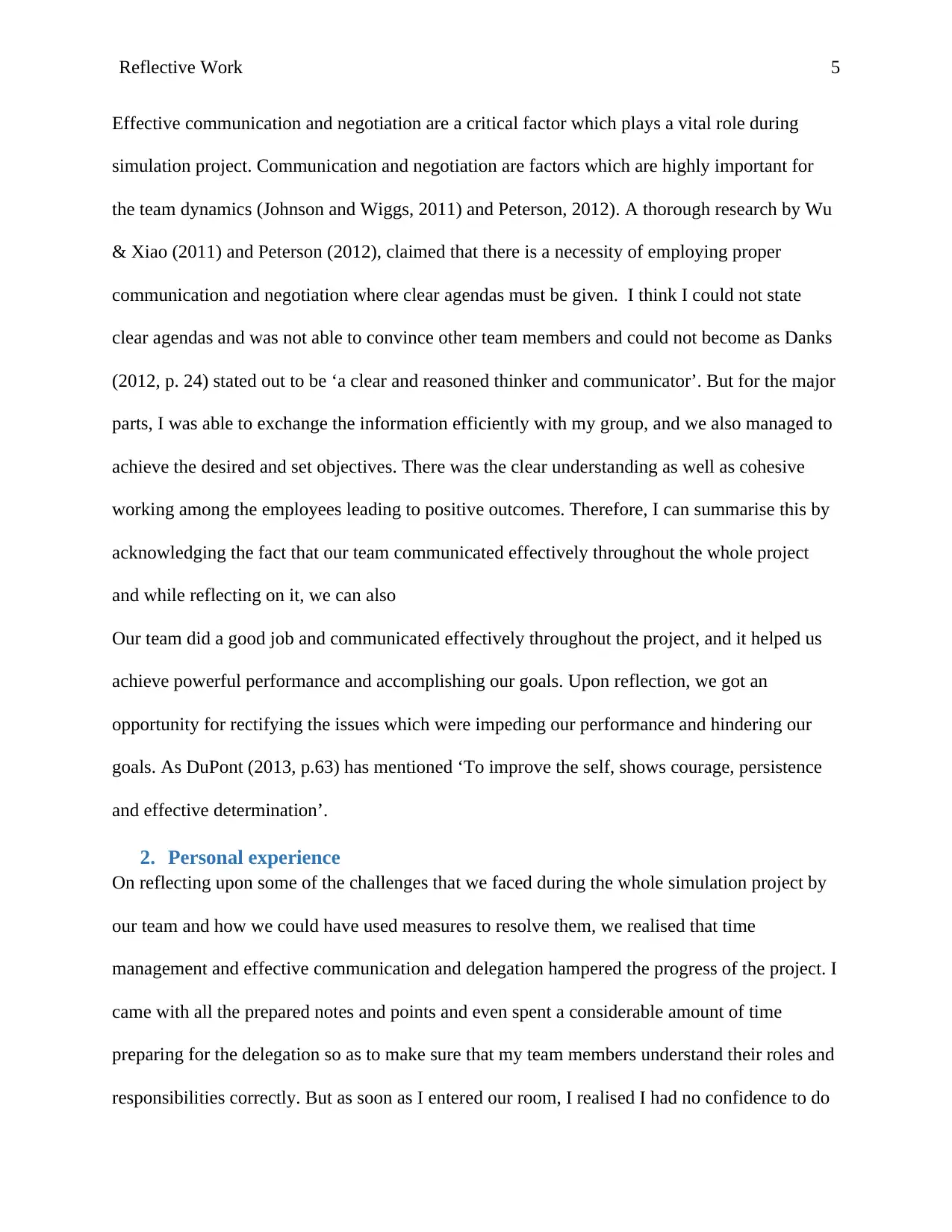
Reflective Work 5
Effective communication and negotiation are a critical factor which plays a vital role during
simulation project. Communication and negotiation are factors which are highly important for
the team dynamics (Johnson and Wiggs, 2011) and Peterson, 2012). A thorough research by Wu
& Xiao (2011) and Peterson (2012), claimed that there is a necessity of employing proper
communication and negotiation where clear agendas must be given. I think I could not state
clear agendas and was not able to convince other team members and could not become as Danks
(2012, p. 24) stated out to be ‘a clear and reasoned thinker and communicator’. But for the major
parts, I was able to exchange the information efficiently with my group, and we also managed to
achieve the desired and set objectives. There was the clear understanding as well as cohesive
working among the employees leading to positive outcomes. Therefore, I can summarise this by
acknowledging the fact that our team communicated effectively throughout the whole project
and while reflecting on it, we can also
Our team did a good job and communicated effectively throughout the project, and it helped us
achieve powerful performance and accomplishing our goals. Upon reflection, we got an
opportunity for rectifying the issues which were impeding our performance and hindering our
goals. As DuPont (2013, p.63) has mentioned ‘To improve the self, shows courage, persistence
and effective determination’.
2. Personal experience
On reflecting upon some of the challenges that we faced during the whole simulation project by
our team and how we could have used measures to resolve them, we realised that time
management and effective communication and delegation hampered the progress of the project. I
came with all the prepared notes and points and even spent a considerable amount of time
preparing for the delegation so as to make sure that my team members understand their roles and
responsibilities correctly. But as soon as I entered our room, I realised I had no confidence to do
Effective communication and negotiation are a critical factor which plays a vital role during
simulation project. Communication and negotiation are factors which are highly important for
the team dynamics (Johnson and Wiggs, 2011) and Peterson, 2012). A thorough research by Wu
& Xiao (2011) and Peterson (2012), claimed that there is a necessity of employing proper
communication and negotiation where clear agendas must be given. I think I could not state
clear agendas and was not able to convince other team members and could not become as Danks
(2012, p. 24) stated out to be ‘a clear and reasoned thinker and communicator’. But for the major
parts, I was able to exchange the information efficiently with my group, and we also managed to
achieve the desired and set objectives. There was the clear understanding as well as cohesive
working among the employees leading to positive outcomes. Therefore, I can summarise this by
acknowledging the fact that our team communicated effectively throughout the whole project
and while reflecting on it, we can also
Our team did a good job and communicated effectively throughout the project, and it helped us
achieve powerful performance and accomplishing our goals. Upon reflection, we got an
opportunity for rectifying the issues which were impeding our performance and hindering our
goals. As DuPont (2013, p.63) has mentioned ‘To improve the self, shows courage, persistence
and effective determination’.
2. Personal experience
On reflecting upon some of the challenges that we faced during the whole simulation project by
our team and how we could have used measures to resolve them, we realised that time
management and effective communication and delegation hampered the progress of the project. I
came with all the prepared notes and points and even spent a considerable amount of time
preparing for the delegation so as to make sure that my team members understand their roles and
responsibilities correctly. But as soon as I entered our room, I realised I had no confidence to do
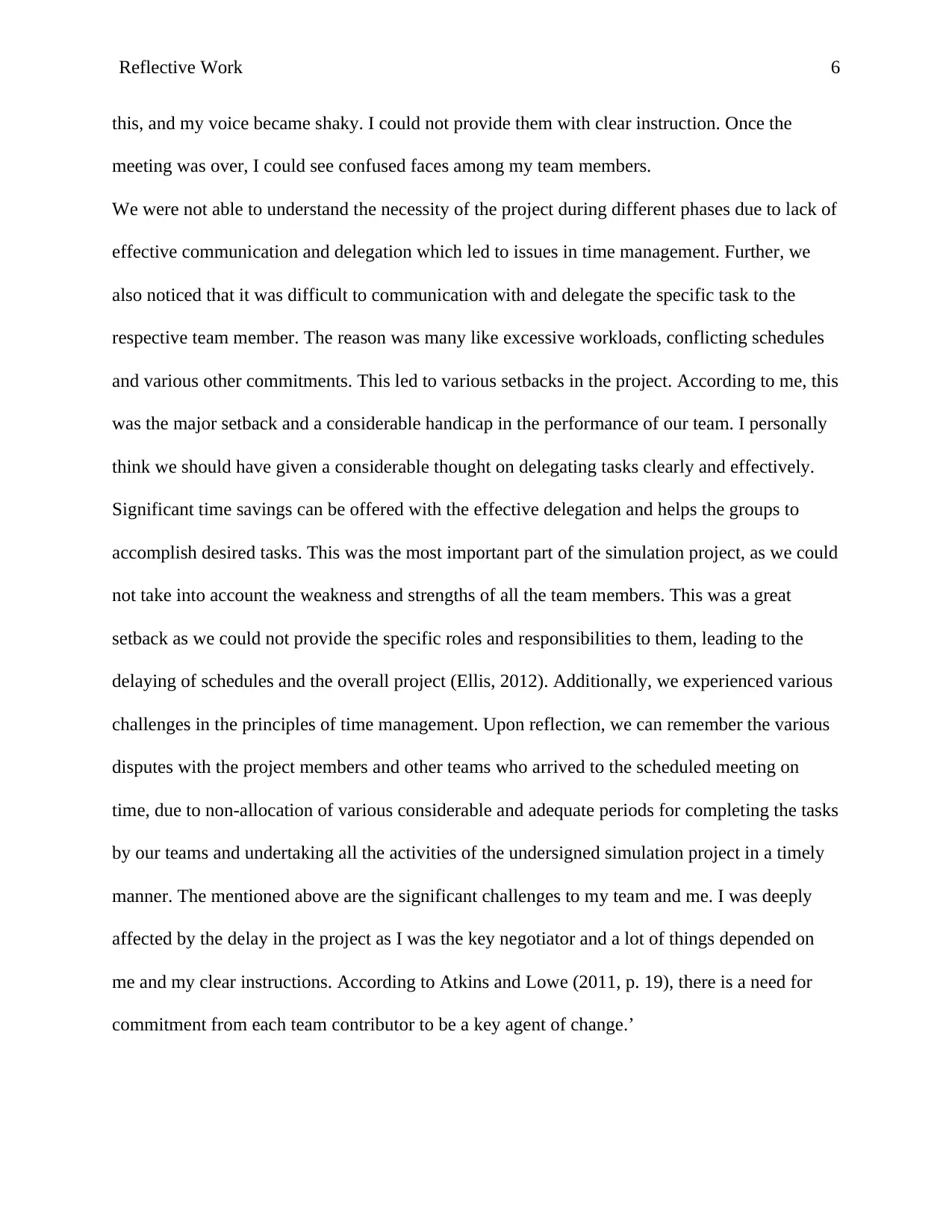
Reflective Work 6
this, and my voice became shaky. I could not provide them with clear instruction. Once the
meeting was over, I could see confused faces among my team members.
We were not able to understand the necessity of the project during different phases due to lack of
effective communication and delegation which led to issues in time management. Further, we
also noticed that it was difficult to communication with and delegate the specific task to the
respective team member. The reason was many like excessive workloads, conflicting schedules
and various other commitments. This led to various setbacks in the project. According to me, this
was the major setback and a considerable handicap in the performance of our team. I personally
think we should have given a considerable thought on delegating tasks clearly and effectively.
Significant time savings can be offered with the effective delegation and helps the groups to
accomplish desired tasks. This was the most important part of the simulation project, as we could
not take into account the weakness and strengths of all the team members. This was a great
setback as we could not provide the specific roles and responsibilities to them, leading to the
delaying of schedules and the overall project (Ellis, 2012). Additionally, we experienced various
challenges in the principles of time management. Upon reflection, we can remember the various
disputes with the project members and other teams who arrived to the scheduled meeting on
time, due to non-allocation of various considerable and adequate periods for completing the tasks
by our teams and undertaking all the activities of the undersigned simulation project in a timely
manner. The mentioned above are the significant challenges to my team and me. I was deeply
affected by the delay in the project as I was the key negotiator and a lot of things depended on
me and my clear instructions. According to Atkins and Lowe (2011, p. 19), there is a need for
commitment from each team contributor to be a key agent of change.’
this, and my voice became shaky. I could not provide them with clear instruction. Once the
meeting was over, I could see confused faces among my team members.
We were not able to understand the necessity of the project during different phases due to lack of
effective communication and delegation which led to issues in time management. Further, we
also noticed that it was difficult to communication with and delegate the specific task to the
respective team member. The reason was many like excessive workloads, conflicting schedules
and various other commitments. This led to various setbacks in the project. According to me, this
was the major setback and a considerable handicap in the performance of our team. I personally
think we should have given a considerable thought on delegating tasks clearly and effectively.
Significant time savings can be offered with the effective delegation and helps the groups to
accomplish desired tasks. This was the most important part of the simulation project, as we could
not take into account the weakness and strengths of all the team members. This was a great
setback as we could not provide the specific roles and responsibilities to them, leading to the
delaying of schedules and the overall project (Ellis, 2012). Additionally, we experienced various
challenges in the principles of time management. Upon reflection, we can remember the various
disputes with the project members and other teams who arrived to the scheduled meeting on
time, due to non-allocation of various considerable and adequate periods for completing the tasks
by our teams and undertaking all the activities of the undersigned simulation project in a timely
manner. The mentioned above are the significant challenges to my team and me. I was deeply
affected by the delay in the project as I was the key negotiator and a lot of things depended on
me and my clear instructions. According to Atkins and Lowe (2011, p. 19), there is a need for
commitment from each team contributor to be a key agent of change.’
⊘ This is a preview!⊘
Do you want full access?
Subscribe today to unlock all pages.

Trusted by 1+ million students worldwide
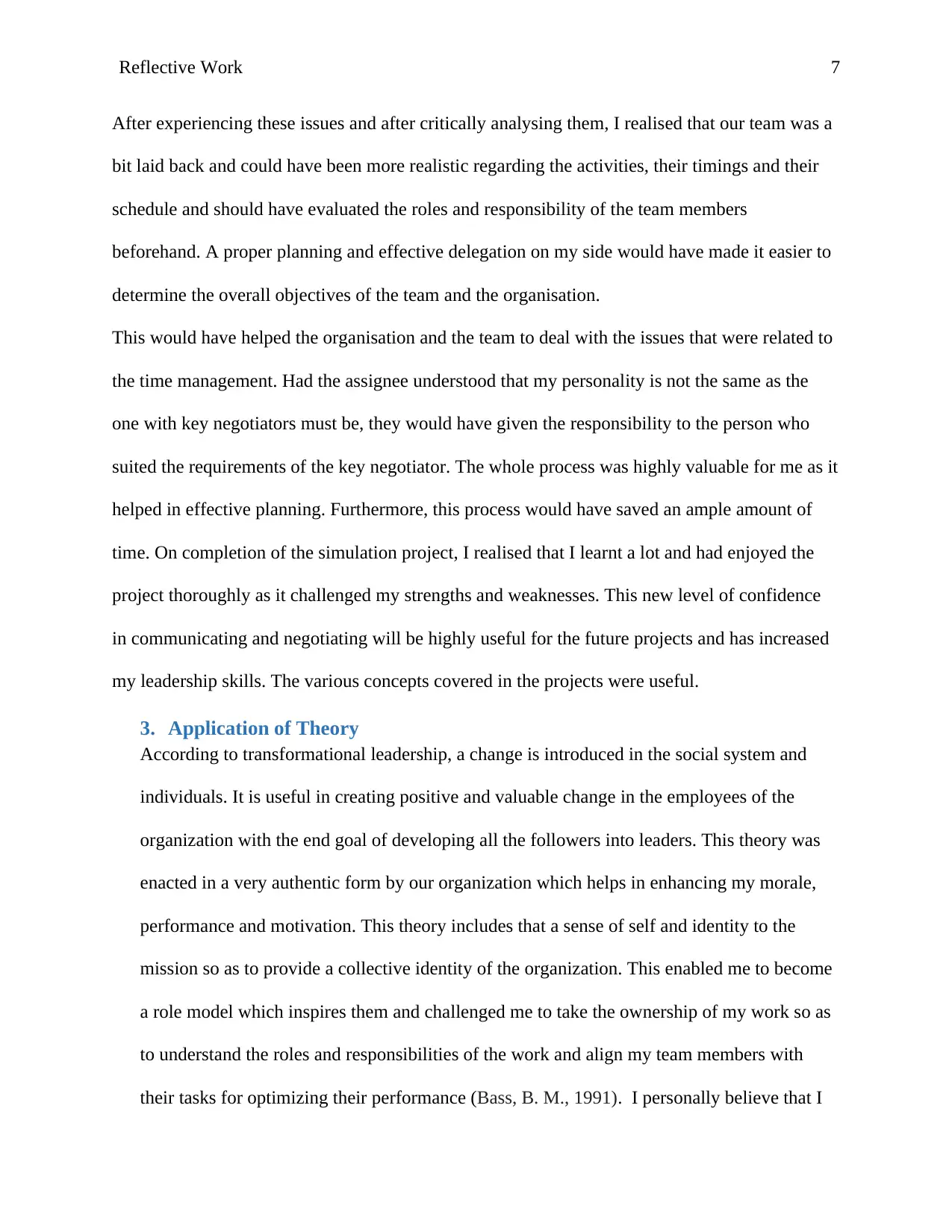
Reflective Work 7
After experiencing these issues and after critically analysing them, I realised that our team was a
bit laid back and could have been more realistic regarding the activities, their timings and their
schedule and should have evaluated the roles and responsibility of the team members
beforehand. A proper planning and effective delegation on my side would have made it easier to
determine the overall objectives of the team and the organisation.
This would have helped the organisation and the team to deal with the issues that were related to
the time management. Had the assignee understood that my personality is not the same as the
one with key negotiators must be, they would have given the responsibility to the person who
suited the requirements of the key negotiator. The whole process was highly valuable for me as it
helped in effective planning. Furthermore, this process would have saved an ample amount of
time. On completion of the simulation project, I realised that I learnt a lot and had enjoyed the
project thoroughly as it challenged my strengths and weaknesses. This new level of confidence
in communicating and negotiating will be highly useful for the future projects and has increased
my leadership skills. The various concepts covered in the projects were useful.
3. Application of Theory
According to transformational leadership, a change is introduced in the social system and
individuals. It is useful in creating positive and valuable change in the employees of the
organization with the end goal of developing all the followers into leaders. This theory was
enacted in a very authentic form by our organization which helps in enhancing my morale,
performance and motivation. This theory includes that a sense of self and identity to the
mission so as to provide a collective identity of the organization. This enabled me to become
a role model which inspires them and challenged me to take the ownership of my work so as
to understand the roles and responsibilities of the work and align my team members with
their tasks for optimizing their performance (Bass, B. M., 1991). I personally believe that I
After experiencing these issues and after critically analysing them, I realised that our team was a
bit laid back and could have been more realistic regarding the activities, their timings and their
schedule and should have evaluated the roles and responsibility of the team members
beforehand. A proper planning and effective delegation on my side would have made it easier to
determine the overall objectives of the team and the organisation.
This would have helped the organisation and the team to deal with the issues that were related to
the time management. Had the assignee understood that my personality is not the same as the
one with key negotiators must be, they would have given the responsibility to the person who
suited the requirements of the key negotiator. The whole process was highly valuable for me as it
helped in effective planning. Furthermore, this process would have saved an ample amount of
time. On completion of the simulation project, I realised that I learnt a lot and had enjoyed the
project thoroughly as it challenged my strengths and weaknesses. This new level of confidence
in communicating and negotiating will be highly useful for the future projects and has increased
my leadership skills. The various concepts covered in the projects were useful.
3. Application of Theory
According to transformational leadership, a change is introduced in the social system and
individuals. It is useful in creating positive and valuable change in the employees of the
organization with the end goal of developing all the followers into leaders. This theory was
enacted in a very authentic form by our organization which helps in enhancing my morale,
performance and motivation. This theory includes that a sense of self and identity to the
mission so as to provide a collective identity of the organization. This enabled me to become
a role model which inspires them and challenged me to take the ownership of my work so as
to understand the roles and responsibilities of the work and align my team members with
their tasks for optimizing their performance (Bass, B. M., 1991). I personally believe that I
Paraphrase This Document
Need a fresh take? Get an instant paraphrase of this document with our AI Paraphraser
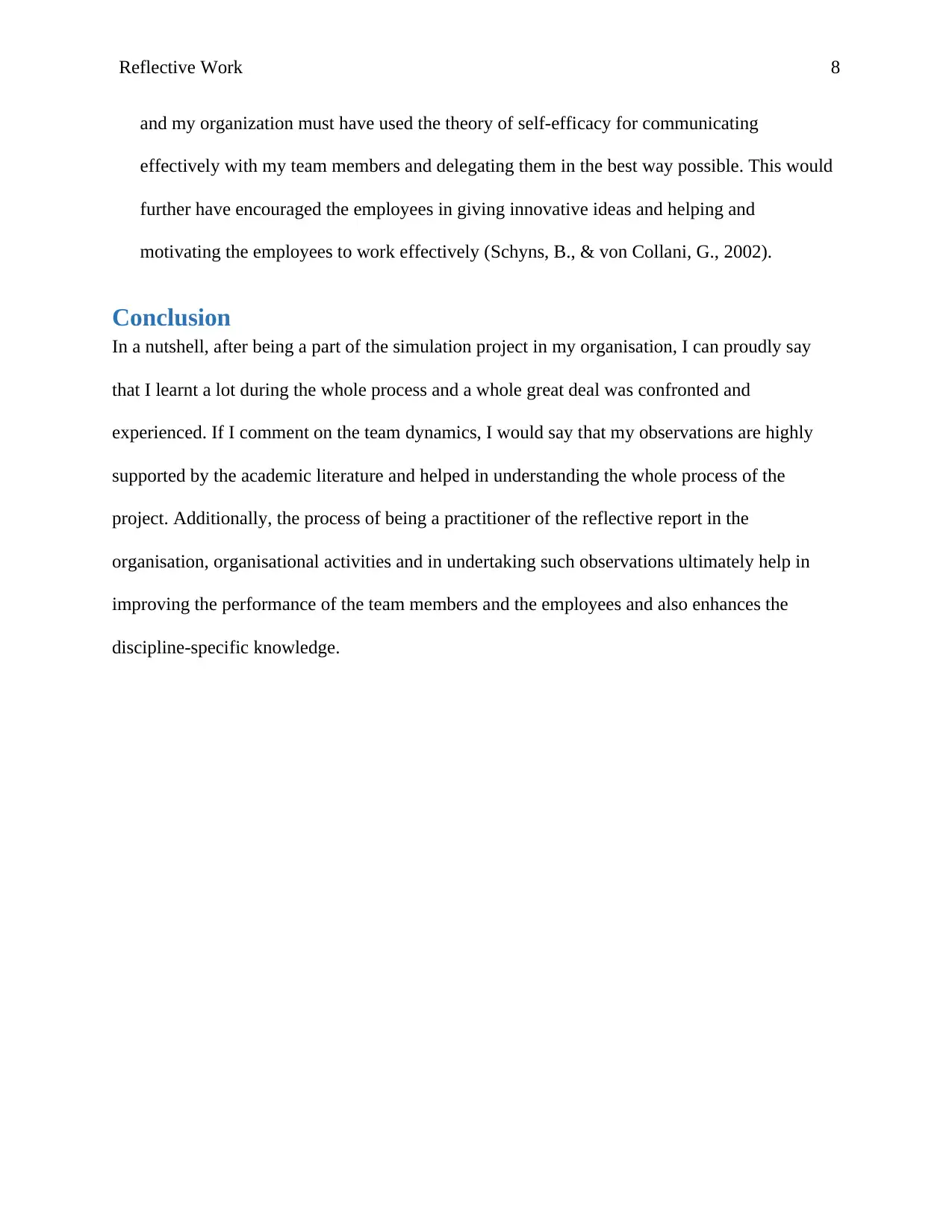
Reflective Work 8
and my organization must have used the theory of self-efficacy for communicating
effectively with my team members and delegating them in the best way possible. This would
further have encouraged the employees in giving innovative ideas and helping and
motivating the employees to work effectively (Schyns, B., & von Collani, G., 2002).
Conclusion
In a nutshell, after being a part of the simulation project in my organisation, I can proudly say
that I learnt a lot during the whole process and a whole great deal was confronted and
experienced. If I comment on the team dynamics, I would say that my observations are highly
supported by the academic literature and helped in understanding the whole process of the
project. Additionally, the process of being a practitioner of the reflective report in the
organisation, organisational activities and in undertaking such observations ultimately help in
improving the performance of the team members and the employees and also enhances the
discipline-specific knowledge.
and my organization must have used the theory of self-efficacy for communicating
effectively with my team members and delegating them in the best way possible. This would
further have encouraged the employees in giving innovative ideas and helping and
motivating the employees to work effectively (Schyns, B., & von Collani, G., 2002).
Conclusion
In a nutshell, after being a part of the simulation project in my organisation, I can proudly say
that I learnt a lot during the whole process and a whole great deal was confronted and
experienced. If I comment on the team dynamics, I would say that my observations are highly
supported by the academic literature and helped in understanding the whole process of the
project. Additionally, the process of being a practitioner of the reflective report in the
organisation, organisational activities and in undertaking such observations ultimately help in
improving the performance of the team members and the employees and also enhances the
discipline-specific knowledge.
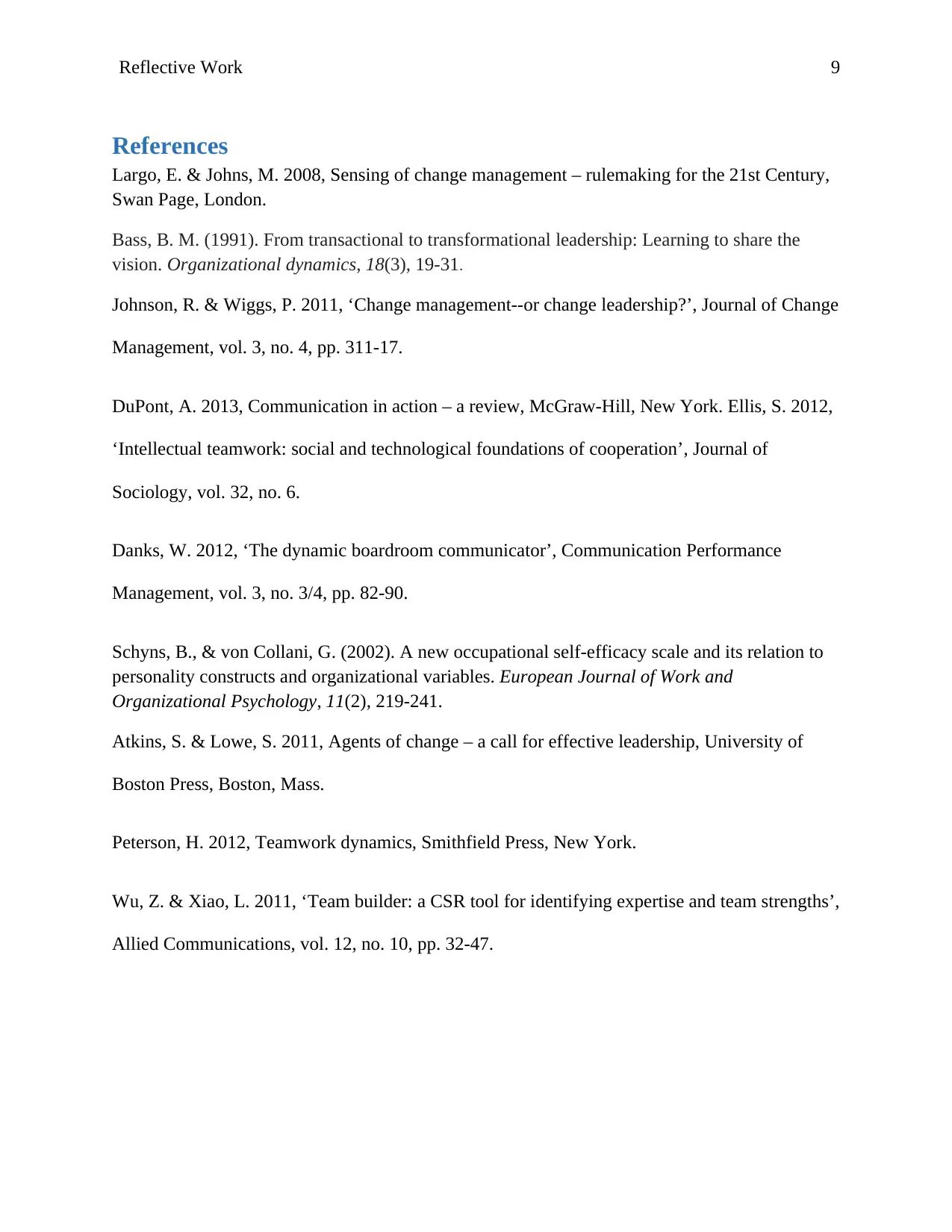
Reflective Work 9
References
Largo, E. & Johns, M. 2008, Sensing of change management – rulemaking for the 21st Century,
Swan Page, London.
Bass, B. M. (1991). From transactional to transformational leadership: Learning to share the
vision. Organizational dynamics, 18(3), 19-31.
Johnson, R. & Wiggs, P. 2011, ‘Change management--or change leadership?’, Journal of Change
Management, vol. 3, no. 4, pp. 311-17.
DuPont, A. 2013, Communication in action – a review, McGraw-Hill, New York. Ellis, S. 2012,
‘Intellectual teamwork: social and technological foundations of cooperation’, Journal of
Sociology, vol. 32, no. 6.
Danks, W. 2012, ‘The dynamic boardroom communicator’, Communication Performance
Management, vol. 3, no. 3/4, pp. 82-90.
Schyns, B., & von Collani, G. (2002). A new occupational self-efficacy scale and its relation to
personality constructs and organizational variables. European Journal of Work and
Organizational Psychology, 11(2), 219-241.
Atkins, S. & Lowe, S. 2011, Agents of change – a call for effective leadership, University of
Boston Press, Boston, Mass.
Peterson, H. 2012, Teamwork dynamics, Smithfield Press, New York.
Wu, Z. & Xiao, L. 2011, ‘Team builder: a CSR tool for identifying expertise and team strengths’,
Allied Communications, vol. 12, no. 10, pp. 32-47.
References
Largo, E. & Johns, M. 2008, Sensing of change management – rulemaking for the 21st Century,
Swan Page, London.
Bass, B. M. (1991). From transactional to transformational leadership: Learning to share the
vision. Organizational dynamics, 18(3), 19-31.
Johnson, R. & Wiggs, P. 2011, ‘Change management--or change leadership?’, Journal of Change
Management, vol. 3, no. 4, pp. 311-17.
DuPont, A. 2013, Communication in action – a review, McGraw-Hill, New York. Ellis, S. 2012,
‘Intellectual teamwork: social and technological foundations of cooperation’, Journal of
Sociology, vol. 32, no. 6.
Danks, W. 2012, ‘The dynamic boardroom communicator’, Communication Performance
Management, vol. 3, no. 3/4, pp. 82-90.
Schyns, B., & von Collani, G. (2002). A new occupational self-efficacy scale and its relation to
personality constructs and organizational variables. European Journal of Work and
Organizational Psychology, 11(2), 219-241.
Atkins, S. & Lowe, S. 2011, Agents of change – a call for effective leadership, University of
Boston Press, Boston, Mass.
Peterson, H. 2012, Teamwork dynamics, Smithfield Press, New York.
Wu, Z. & Xiao, L. 2011, ‘Team builder: a CSR tool for identifying expertise and team strengths’,
Allied Communications, vol. 12, no. 10, pp. 32-47.
⊘ This is a preview!⊘
Do you want full access?
Subscribe today to unlock all pages.

Trusted by 1+ million students worldwide
1 out of 9
Related Documents
Your All-in-One AI-Powered Toolkit for Academic Success.
+13062052269
info@desklib.com
Available 24*7 on WhatsApp / Email
![[object Object]](/_next/static/media/star-bottom.7253800d.svg)
Unlock your academic potential
Copyright © 2020–2026 A2Z Services. All Rights Reserved. Developed and managed by ZUCOL.





